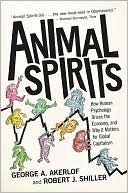List Books » Animal Spirits: How Human Psychology Drives the Economy, and Why It Matters for Global Capitalism
Category Books
- Fiction Books & Literature
- Graphic Novels
- Horror
- Mystery & Crime
- Poetry
- Romance Books
- Science Fiction & Fantasy
- Thrillers
- Westerns
- Ages 0-2
- Ages 3-5
- Ages 6-8
- Ages 9-12
- Teens
- Children's Books
- African Americans
- Antiques & Collectibles
- Art, Architecture & Photography
- Bibles & Bible Studies
- Biography
- Business Books
- Christianity
- Computer Books & Technology Books
- Cookbooks, Food & Wine
- Crafts & Hobbies Books
- Education & Teaching
- Engineering
- Entertainment
- Foreign Languages
- Game Books
- Gay & Lesbian
- Health Books, Diet & Fitness Books
- History
- Home & Garden
- Humor Books
- Judaism & Judaica
- Law
- Medical Books
- New Age & Spirituality
- Nonfiction
- Parenting & Family
- Pets
- Philosophy
- Political Books & Current Events Books
- Psychology & Psychotherapy
- Reference
- Religion Books
- Science & Nature
- Self Improvement
- Sex & Relationships
- Social Sciences
- Sports & Adventure
- Study Guides & Test Prep
- Travel
- True Crime
- Weddings
- Women's Studies
Animal Spirits: How Human Psychology Drives the Economy, and Why It Matters for Global Capitalism »

Authors: George A. Akerlof, Robert J. Shiller
ISBN-13: 9780691145921, ISBN-10: 069114592X
Format: Paperback
Publisher: Princeton University Press
Date Published: February 2010
Edition: (Non-applicable)
Author Biography: George A. Akerlof
George A. Akerlof is the Daniel E. Koshland Sr. Distinguished Professor of Economics at the University of California, Berkeley. He was awarded the 2001 Nobel Prize in economics. Robert J. Shiller is the best-selling author of "Irrational Exuberance" and "The Subprime Solution" (both Princeton). He is the Arthur M. Okun Professor of Economics at Yale University.
Book Synopsis
"This book is a sorely needed corrective. Animal Spirits is an important--maybe even a decisive--contribution at a difficult juncture in macroeconomic theory."--Robert M. Solow, Nobel Prize-winning economist
"This book is dynamite. It is a powerful, cogent, and convincing call for a fundamental reevaluation of basic economic principles. It presents a refreshingly new understanding of important economic phenomena that standard economic theory has been unable to explain convincingly. Animal Spirits should help set in motion an intellectual revolution that will change the way we think about economic depressions, unemployment, poverty, financial crises, real estate swings, and much more."--Dennis J. Snower, president of the Kiel Institute for the World Economy
"Animal Spirits makes a very timely and significant contribution to the development of a new dominant paradigm for economics that acknowledges the imperfections of human decision making, a need which the panic in financial markets makes all too apparent. I am not aware of any other book like this one."--Diane Coyle, author of The Soulful Science: What Economists Really Do and Why It Matters
"Akerlof and Shiller explore how animal spirits contribute to the performance of the macroeconomy. The range of issues they cover is broad, including the business cycle, inflation and unemployment, the swings in financial markets and real estate, the existence of poverty, and the way monetary policy works. This book is provocative and persuasive."--George L. Perry, Brookings Institution
The New York Times - Louis Uchitelle
Until now, behavioral economics has focused mainly on a variety of disparate traits that chip away at the assumption of rationality embedded in mainstream theory. A young person, for example, fails to join a 401(k) plan, even one subsidized by his employer, although if he were rational and fully informed, he would certainly sign up. What Akerlof and Shiller do is to highlight this sort of finding, packaging it with numerous other psychological insights into a half-dozen broad maxims that permanently alter the concept of rational behavior. And their book takes their case not just to economists, but also to the general reader. It is short (176 pages of text) and easy enough for laymen to understand (most of the time).
Table of Contents
Introduction 1
Pt. 1 Animal Spirits
1 Confidence and Its Multipliers 11
2 Fairness 19
3 Corruption and Bad Faith 26
4 Money Illusion 41
5 Stories 51
Pt. 2 Eight Questions and Their Answers
6 Why Do Economies Fall into Depression? 59
7 Why Do Central Bankers Have Power over the Economy (Insofar as They Do)? 74
Postscript to Chapter Seven: The Current Financial Crisis: What Is to Be Done? 86
8 Why Are There People Who Cannot Find a Job? 97
9 Why Is There a Trade-off between Inflation and Unemployment in the Long Run? 107
10 Why Is Saving for the Future So Arbitrary? 116
11 Why Are Financial Prices and Corporate Investments So Volatile? 131
12 Why Do Real Estate Markets Go through Cycles? 149
13 Why Is There Special Poverty among Minorities? 157
14 Conclusion 167
Notes 177
References 199
Index 219
Subjects
 Economics
Economics  Economic Systems
Economic SystemsBusiness Books
 Economics
Economics  Economics - General & Miscellaneous
Economics - General & MiscellaneousNonfiction
 All Nonfiction
All Nonfiction  Economics & Politics
Economics & PoliticsPolitical Books & Current Events Books
 Economics & Politics
Economics & Politics  Economic Policies
Economic PoliciesPolitical Books & Current Events Books
 All Politics
All Politics  Economics & Politics
Economics & PoliticsNonfiction
 Politics & Current Affairs
Politics & Current Affairs  Economics & Politics
Economics & PoliticsNonfiction
 Politics & Current Affairs
Politics & Current Affairs  All Politics
All Politics
